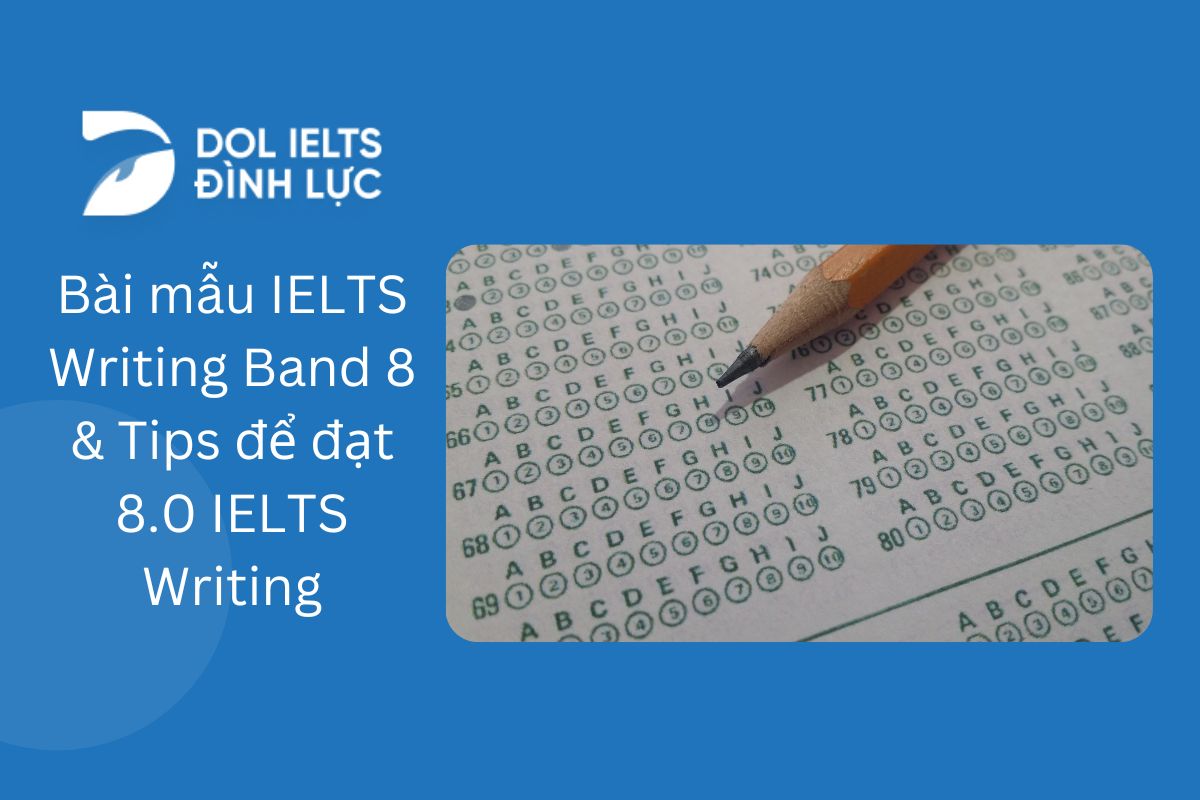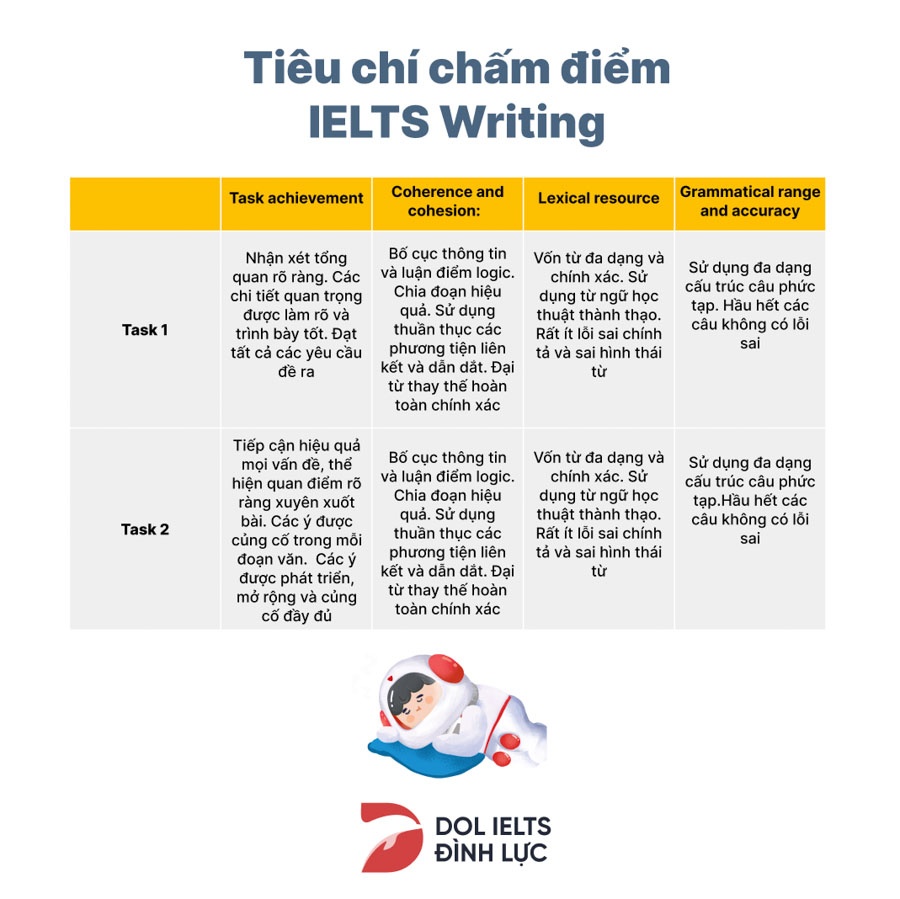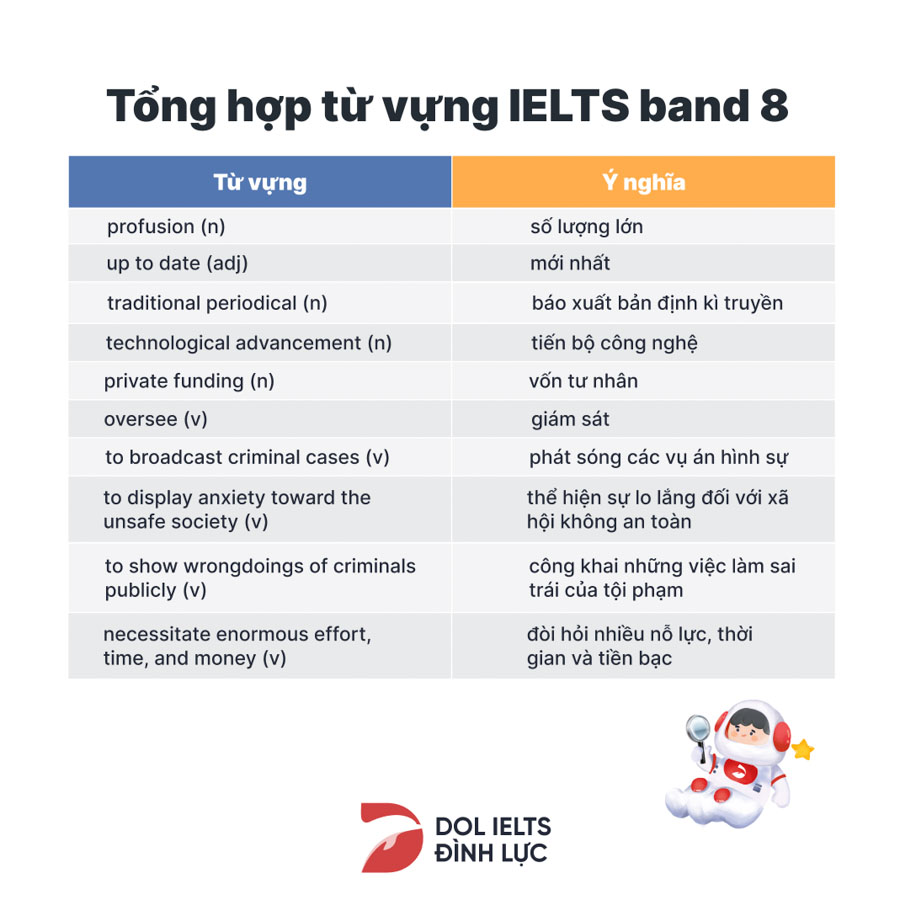Tổng hợp IELTS Writing Task 2 Sample Band 8 hay nhất
Chinh phục band 8 IELTS Writing cùng Dolenglish với các tips viết bài hiệu quả & các bài viết mẫu band 8, giúp người học hiểu rõ về tiêu chí của band điểm này.
DOL IELTS Đình Lực
Jul 10, 2023
2 mins read

Table of content
1. Tiêu chí chấm điểm IELTS Writing
2. Bài mẫu band 8
3. Cải thiện bài viết từ band 6.5 lên band 8.0
4. Câu hỏi thường gặp
1. Tiêu chí chấm điểm IELTS Writing

Tiêu chi chấm IELTS writing band 8 task 1 và task 2 sẽ nhìn như sau:
Task | Task achievement | Coherence and cohesion: | Lexical resource | Grammatical range and accuracy |
Task 1 | Nhận xét tổng quan rõ ràng. Các chi tiết quan trọng được làm rõ và trình bày tốt. Đạt tất cả các yêu cầu đề ra | Bố cục thông tin và luận điểm logic. Chia đoạn hiệu quả. Sử dụng thuần thục các phương tiện liên kết và dẫn dắt. Đại từ thay thế hoàn toàn chính xác | Vốn từ đa dạng và chính xác. Sử dụng từ ngữ học thuật thành thạo. Rất ít lỗi sai chính tả và sai hình thái từ | Sử dụng đa dạng cấu trúc câu phức tạp. Hầu hết các câu không có lỗi sai |
Task 2 | Tiếp cận hiệu quả mọi vấn đề và câu hỏi trong đề bài. Thể hiện quan điểm rõ ràng xuyên xuốt bài. Các ý được củng cố trong mỗi đoạn văn. Các ý chính phù hợp. Các ý được phát triển, mở rộng và củng cố đầy đủ | Bố cục thông tin và luận điểm logic. Chia đoạn hiệu quả. Sử dụng thuần thục các phương tiện liên kết và dẫn dắt. Đại từ thay thế hoàn toàn chính xác | Vốn từ đa dạng và chính xác. Sử dụng từ ngữ học thuật thành thạo. Rất ít lỗi sai chính tả và sai hình thái từ | Sử dụng đa dạng cấu trúc câu phức tạp.Hầu hết các câu không có lỗi sai |
Bạn sẽ thấy trong phần mô tả band điểm, một bài viết band 8 là bài viết sử dụng một cách khéo léo những từ vựng không phổ biến. Thuật ngữ phổ biến là những từ và cụm từ chúng ta sử dụng hàng ngày còn các thuật ngữ không phổ biến được sử dụng khi chúng ta thảo luận về các chủ đề cụ thể hoặc khi chúng ta sử dụng ngôn ngữ thành ngữ (cụm động từ).
https://ielts.com.au/australia/prepare/article-ielts-writing-task-2-8-steps-towards-a-band-8
Lưu ý, tất nhiên để đạt được mức “cân nhắc lên band 8”, bạn cần đạt tiêu chuẩn các band còn lại nhé.
2. Bài mẫu band 8
DOL gửi bạn xem qua một số bài band 8.0 với các chủ đề khác nhau nhé!
Sample 1
Some people think that people should be given the right to use fresh water as they like. Others believe governments should strictly control the use of fresh water. Discuss both views and give your own opinion.

Luận điểm chính:
Body paragraph 1: Being able to use fresh, clean water is a human's basic necessity
Water is a fundamental contributing to human’s well-being.
If people were not to get an adequate amount of water to sustain basic activities
=> their human rights would have been violated.
People have varying needs for water => restricting the amount of water used - disadvantageous
Body paragraph 2: Introducing regulations on fresh water usage
Water is a scarce resource => if individuals are free to use water at their own discretion => depletion
People in some countries who have difficult access to fresh water - receive less as people in other countries have used it extravagantly
Sample:
Whether citizens should be allowed to use fresh water freely or governments should put restrictions on the amount of fresh water citizens can have access to has gained traction. In my opinion, while each view has its merits, I agree that water usage should be regulated.
On the one hand, being able to use fresh, clean water is a human's basic necessity. First, besides food, water is another fundamental contributing to human’s well-being. Therefore, if people were not to get an adequate amount of water to sustain basic activities such as hydrating themselves, cooking, and cleaning, their human rights would have been violated. Secondly, people have varying needs for water so restricting the amount of water used to an average number would be disadvantageous to those whose businesses involve heavy water usage, for example, people involved in farming activities.
On the other hand, introducing regulations on fresh water usage can have undeniable positive effects. Water is a scarce resource, so making it freely available can lead to depletion of fresh water and unequal distribution of water. As a matter of fact, water sources have been depleting in recent years due to global warming, droughts, and pollution. Consequently, if individuals are free to use water at their own discretion, it will lead to faster exhaustion of this rare resource. Another grave effect is that people in some countries who have difficult access to fresh water will have to receive less as people in other countries have used it extravagantly.
By and large, I opine that despite water being a common property, people should not be given unlimited usage of that resource, but should rather follow the government’s regulations and distribution.
Từ vựng nâng cao:
fresh water: frɛʃ ˈwɔːtə (Noun) - nước ngọt
Ví dụ: Salt water is much more conductive than fresh water is.
to put restrictions on something: tuː pʊt rɪsˈtrɪkʃənz ɒn ˈsʌmθɪŋ (Verb) - hạn chế một cái gì đó
Ví dụ: Whether citizens should be allowed to use fresh water freely or governments should put restrictions on the amount of fresh water citizens can have access to has gained traction.
a human's basic necessity: ə ˈhjuːmənz ˈbeɪsɪk nɪˈsɛsɪti (Noun) - nhu cầu cơ bản của con người
Ví dụ: Being able to use fresh, clean water is a human's basic necessity.
adequate: ˈædɪkwɪt (Adjective) - đủ
Ví dụ: Their earnings are adequate to their needs.
to hydrate: tu: ˈhaɪdreɪt (Verb) - cung cấp nước cho cơ thể
Ví dụ: After you run, drink plenty of water to stay well hydrated.
disadvantageous: dɪsædvɑːnˈteɪʤəs (Adjective) - bất lợi
Ví dụ: The lack of money makes us a disadvantageous position.
heavy water usage: ˈhɛvi ˈwɔːtə ˈjuːzɪʤ (Noun) - sử dụng nhiều nước
Ví dụ: Restricting the amount of water used to an average number would be disadvantageous to those whose businesses involve heavy water usage.
a scarce resource: ə skeəs rɪˈsɔːs (Noun) - nguồn tài nguyên khan hiếm
Ví dụ: Water is a scarce resource, so making it freely available can lead to depletion of fresh water and unequal distribution of water.
unequal distribution of water: ʌnˈiːkwəl ˌdɪstrɪˈbjuːʃən ɒv ˈwɔːtə (Noun) - phân phối nước không đồng đều
Ví dụ: Water is a scarce resource, so making it freely available can lead to depletion of fresh water and unequal distribution of water.
extravagantly: ɪksˈtrævɪgəntli (Adverb) - phung phí
Ví dụ: We are not spending extravagantly, but spending reasonably and temperately.
Sample 2
The education of young people is the main priority in countries around the world. Some people believe that educating adults who cannot read or write is essential for the society and more funding should be made available for it. Do you agree or disagree?

Luận điểm chính:
Body paragraph 1: A decline in the rate of illiterate adults can offer countries strategic economic advantages
Increase the number of high quality laborers => improved economic growth
A high rate of illiteracy among adults => heavy burdens on social assistance
Example: monetary assistance during the Covid-19 pandemic
Body paragraph 2: Individuals
Adults who cannot read nor write often shy away from social interactions => a sense of inferiority
Children with illiterate parents help their parents make ends meet => lose their access to education
Sample:
While some people claim that educating the young should be the main concern the world over, others believe that more funds should be allocated to decrease the rate of illiteracy among adults. From my perspective, I side with the latter idea as adult schooling can have positive impacts on the development of countries and individuals.
To start with, a decline in the rate of illiterate adults can offer countries strategic economic advantages. First, this will increase the number of high quality laborers in the country, resulting in improved economic growth. As most white-collar positions’ minimum requirement nowadays is the ability to read and write, illiterate adults will have to resort to low-paid work, which means a loss of tax, as well as scarce resources of intellectual workers. Secondly, having a high rate of illiteracy among adults may also lead to heavy burdens on social assistance. During times of crisis, such as the Covid-19 pandemic, illiterate adults are the ones who are most prone to unemployment. The indication of this is that governments will have to provide them monetary assistance, thus, the larger the number of uneducated grown-ups, the more considerable the subsidy.
Regarding individuals, being able to read and write can be advantageous to one’s mental health and their offsprings. What illiteracy brings to individuals is low self-esteem. Adults who cannot read nor write often shy away from social interactions, as well as experience a sense of inferiority due to their lack of basic abilities. Moreover, children with illiterate parents often lose their access to education. Since their mothers and fathers often cannot find well-paid jobs that can cover their school fees, these kids have to help their parents make ends meet from an early age, resulting in illiteracy from one generation to the next.
All in all, adult schooling is beneficial in terms of economic growth for nations and of fostering well-being for individuals.
Từ vựng nâng cao:
to decrease the rate of illiteracy among adults: tu: ˈdiːkriːs ðə reɪt ɒv ɪˈlɪtərəsi əˈmʌŋ ˈædʌlts (Verb) - giảm tỷ lệ mù chữ ở người lớn
Ví dụ: While some people claim that educating the young should be the main concern the world over, others believe that more funds should be allocated to decrease the rate of illiteracy among adults.
strategic economic advantages: strəˈtiːʤɪk ˌiːkəˈnɒmɪk ədˈvɑːntɪʤɪz (Noun) - lợi thế kinh tế chiến lược
Ví dụ: A decline in the rate of illiterate adults can offer countries strategic economic advantages.
high quality laborers: haɪ ˈkwɒlɪti ˈleɪbərəz (Noun) - lao động chất lượng cao
Ví dụ: Deputy director of FALMI said that from now to the end of 2018 the city would recruit 148,000 high quality laborers to work in key sectors and fields.
white-collar: ˈwaɪtˈkɒlə (Adjective) - [thuộc] công chức (không phải là công nhân)
Ví dụ: Many white-collar workers, like stock brokers and investment bankers, find themselves in the unemployment lines.
to resort to low-paid work: tu: rɪˈzɔːt tuː ˈləʊˈpeɪd wɜːk (Verb) - dùng đến công việc được trả lương thấp
Ví dụ: As most white-collar positions’ minimum requirement nowadays is the ability to read and write, illiterate adults will have to resort to low-paid work, which means a loss of tax, as well as scarce resources of intellectual workers.
social assistance: ˈsəʊʃəl əˈsɪstəns (Noun) - trợ cấp xã hội
Ví dụ: Having a high rate of illiteracy among adults may also lead to heavy burdens on social assistance.
low self-esteem: ləʊ sɛlf-ɪsˈtiːm (Noun) - lòng tự tôn thấp
Ví dụ: What illiteracy brings to individuals is low self-esteem.
a sense of inferiority: ə sɛns ɒv ɪnˌfɪərɪˈɒrɪti (Noun) - cảm giác tự ti
Ví dụ: Adults who cannot read nor write often shy away from social interactions, as well as experience a sense of inferiority due to their lack of basic abilities.
to lose one's access to education: tu: luːz wʌnz ˈæksɛs tuː ˌɛdju(ː)ˈkeɪʃən (Verb) - đánh mất quyền tiếp cận giáo dục của một người
Ví dụ: Children with illiterate parents often lose their access to education.
to make ends meet: tu: meɪk ɛndz miːt (Verb) - kiếm đủ tiền để sống
Ví dụ: Being out of work and having two young children, they found it impossible to make ends meet
Sample 3
Some people think technology development decreases crime, while others believe it actually encourages crimes. Discuss both views and give your own opinion.
Luận điểm chính:
Body paragraph 1: Developments in technology have paved the way for an emerging kind of crime: cyber-crime
Most transactions nowadays are done via the Internet => thieves can hack into one’s account => sending the money to his bank account
Example: a number of Vietnamese middle-aged women was swindled out of millions by imposters acting as their children or relatives online
Body paragraph 2: Technological advancements have helped solve cases faster and prevent criminal activities
High-tech gears and programs can help detect offenders effectively and in a timely manner
Example: a 35-year-old cold case in Texas has just been solved using DNA technology
Another use of technological developments is to prevent crimes
Released convicts will usually be forced to wear a GPS tracking device => many criminals have abandoned their recidivism plan
Sample
While some people argue that technological advancements help reduce the number of criminal activities, others opine that it actually increases the crime rate. Personally, I side with the former as progress in technology has had a positive impact on the world's crime scene.
On the one hand, developments in technology have paved the way for an emerging kind of crime: cyber-crime. As most transactions nowadays are done via the Internet, thieves can hack into one’s account and tamper with online transactions, sending the money to his bank account instead of that of the actual recipient of the payment. A milder case would be information thievery, in which one’s personal information would be stolen and sold to a third party, who, in a positive case, are advertising companies, or to catfishes, in the worst case scenario. For example, a number of frauds in Vietnam happened to middle-aged women, who were swindled out of millions by imposters acting as their children or relatives online.
On the other hand, technological advancements have helped solve cases faster and prevent criminal activities. First, high-tech gears and programs can help detect offenders effectively and in a timely manner. To illustrate, a 35-year-old cold case in Texas has just been solved using DNA technology. The 1986 murder was thought to be hopeless as no visible evidences were found, yet innovations in crime science has brought new and concrete proofs. Another use of technological developments is to prevent crimes. What this means is that through the use of technology, crime attempts can be deterred. For example, released convicts will usually be forced to wear a GPS tracking device. Thanks to this, many criminals have abandoned their recidivism plan as they could be easily sent back to jail.
To conclude, although there are sound arguments as to why technology developments can facilitate crimes, I believe that, in reality, it can help avert criminal activities.
Từ vựng nâng cao:
technological advancements: ˌtɛknəˈlɒʤɪk(ə)l ədˈvɑːnsmənts (Noun) - tiến bộ công nghệ
Ví dụ: The last decade has been very progressive in terms of the promising technological advancements and transformations.
to have a positive impact on something: tu: hæv ə ˈpɒzətɪv ˈɪmpækt ɒn ˈsʌmθɪŋ (Verb) - có tác động tích cực đến một cái gì đó
Ví dụ: Progress in technology has had a positive impact on the world's crime scene.
to pave the way for something: tu: peɪv ðə weɪ fɔː ˈsʌmθɪŋ (Verb) - mở đường cho một cái gì đó
Ví dụ: Their economic policy pave the way for industrial expansion.
cyber-crime: ˈsaɪbə-kraɪm (Noun) - tội phạm mạng
Ví dụ: Even though cyber-crime is perhaps the fastest-growing industry of the new economy, most businesses are not taking adequate precautions.
transaction: trænˈzækʃən (Noun) - giao dịch
Ví dụ: The entire transaction took place over the phone.
recipient: rɪˈsɪpɪənt (Noun) - người nhận
Ví dụ: Former Nobel Peace Prize recipients include Jimmy Carter and Barack Obama.
information thievery: ˌɪnfəˈmeɪʃən ˈθiːvəri (Noun) - ăn cắp thông tin
Ví dụ: Information thievery is a case in which one’s personal information would be stolen and sold to a third party.
to prevent criminal activity: tu: prɪˈvɛnt ˈkrɪmɪnl ækˈtɪvɪti (Verb) - ngăn chặn hoạt động tội phạm
Ví dụ: Technological advancements have helped solve cases faster and prevent criminal activities.
high-tech: haɪ-tɛk (Adjective) - công nghệ cao
Ví dụ: High-tech industries are an important part of the U.S. economy, employing nearly 17 million workers in 2014.
concrete proof: ˈkɒnkriːt pruːf (Noun) - bằng chứng cụ thể
Ví dụ: We now have concrete proof that the arsonists and looters were nearly all hardened criminals.
released convict: rɪˈliːst ˈkɒnvɪkt (Noun) - tù nhân đã được thả
Ví dụ: Released convicts will usually be forced to wear a GPS tracking device.
recidivism: rɪˈsɪdɪvɪzm (Noun) - tái phạm
Ví dụ: Recidivism rates are 25 percent lower for offenders who get structured treatment.
Sample 4
Fewer young people choose to work in farming. What are the reasons? Should young people be encouraged to do farming work?
Luận điểm chính:
Body paragraph 1: Reasons why young adults shy away from farming work
The prosperity of new and more lucrative occupations
agriculture does not have a high income and this earning is unstable
Universal education
young people think that being farmers is not high-class => gravitate towards jobs that are perceived as smart and classy
Body paragraph 2: Young adults should be incentivized to become farmers
Importance
Farming has been and will always be one of the most important sectors of society => a shortage in personnel could lead to worldwide crisis
Universal education
young people think that being farmers is not high-class => gravitate towards jobs that are perceived as smart and classy
Body paragraph 2: Young adults should be incentivized to become farmers
Sample:
Nowadays, more and more youngsters avoid working in the agricultural sector. This trend can stem from several causes that will be discussed in this essay, along with a number of reasons why there should be more young farmers.
There are two reasons why young adults shy away from farming work. First, the prosperity of new and more lucrative occupations leads to people favoring these posts. Compared to other sectors, agriculture around the world does not have a high income and oftentimes, this earning is unstable as it depends heavily on the yield of the crops. Another possible cause for this trend is universal education, which leads to more young people thinking that being farmers is not high-class enough for an educated person. They tend to gravitate towards jobs that are perceived as smart and classy, such as white-collar professions, since lives on the farm are usually painted as modest and dull.
Despite the aforementioned reasons, young adults should be incentivized to become farmers. First, farming has been and will always be one of the most important sectors of society, that is why a shortage in personnel could lead to worldwide crisis. Food being one of the fundamentals of life means that its supply process should be well-oiled in order to sustain people’s well-being. This can only be achieved if there is a sufficient supply of manpower to carry out the production. Moreover, young minds can help drive improvements in this ancient profession. As youngsters are more adaptive to new technologies, they can apply these to their farms and as a result, produce healthier food.
To conclude, young people nowadays are likely to avoid working on farms due to the expansion of alternative professions and universal education. However, these youngsters should be encouraged to participate in farming activities since they can offer manpower and introduce innovativeness to agriculture.

3. Cải thiện bài viết từ band 6.5 lên band 8.0
Đọc bài mẫu là một trong những cách hữu ích để có thể hiểu được một bài Band 8 như thế nào, nhưng bạn có biết cách làm sao để viết được bài Band 8? Như ban đã biết thì bài thi IELTS Writing sẽ được chấm dựa trên 4 tiêu chí
Task Response
Coherence and Cohesion
Lexical resource
Grammatical Range and Accuracy
Do đó, để đạt được band 8, bài viết của bạn phải đáp ứng đúng và đủ các tiêu chí trên. Cụ thể hơn ở band 8, thí sinh được yêu cầu phải viết bài viết đảm bảo các nội dung sau:
Task Response:
Trả lời đầy đủ các phần của câu hỏi.
Câu trả lời được phát triển tốt cho câu hỏi với các ý tưởng có liên quan, mở rộng và được hỗ trợ lẫn nhau.
Task Response:
Trình tự thông tin và ý tưởng.
Hợp lý.
Bài có tính liên kết và mạch lạc.
Sử dụng đoạn văn đầy đủ và thích hợp.
Lexical resource
Trình tự thông tin và ý tưởng.
Bài có tính liên kết và mạch lạc.
Sử dụng đa dạng từ vựng.
Lưu loát và linh hoạt để truyền đạt ý nghĩa chính xác.
Khéo léo sử dụng các từ vựng không phổ biến nhưng đôi khi có thể không chính xác trong việc lựa chọn từ và sắp xếp thứ tự.
Ít mắc lỗi chính tả và/hoặc cấu tạo từ.
Grammatical Range and Accuracy
Sử dụng nhiều loại cấu trúc.
Phần lớn các câu không mắc lỗi.
Chỉ thỉnh thoảng mắc lỗi hoặc dùng không đúng ngữ pháp.
Link tải tài liệu luyện Writing IELTS Task 2:
4. Câu hỏi thường gặp
Đạt điểm 8 trong phần thi IELTS Writing có khó không?
Câu trả lời là có! Đạt điểm 8 trong phần thi IELTS Writing được xem là thành tựu rất tốt. Vì bài thi viết luôn được các thí sinh nhận xét là khó đạt điểm cao. Theo đó, để có được số điểm này, thí sinh phải thể hiện khả năng viết tiếng Anh rõ ràng, mạch lạc, các luận điểm chặt chẽ. Cùng với đó là gần như không mắc lỗi sai chính tả và ngữ pháp.
Những lỗi thường gặp khi sử dụng các ngữ pháp câu trong phần thi IELTS Writing mà thí sinh cần tránh?
Mệnh đề Quan hệ: Sử dụng đại từ không đúng - who/that/which
Mệnh đề Điều kiện: Chọn sai thì của động từ cho loại mệnh đề - Hiện tại hoàn thành/quá khứ: Chọn sai thì của động từ - had/have had
Bị động: Chọn sai động từ thể bị động
Danh động từ: Mắc lỗi khi sử dụng -ing
Danh từ Đếm được: Mắc lỗi khi sử dụng danh từ số ít và số nhiều
Quán từ: Sử dụng a/the không đúng, hoặc không sử dụng quán từ
Thống nhất về chủ ngữ/động từ: The girls ‘are’ – số ít hay số nhiều
Giới từ: Chọn sai giới từ độc lập, hay sai giới từ địa điểm, v.v.
Dấu câu: Sử dụng không đúng cách, hoặc không sử dụng.
Gợi ý 1 số đề bài luyện thi IELTS Writing
Some people think that ït is best to encourage children to leave their family home as soon as possible. Others believe children should stay at the family home for as long as they like. Discuss both views and give your own opinion.
As computers are being used more and more in education, there will be soon no role for teachers in the classroom. Do you agree or disagree?
Some say that rich countries should help poor countries with trade, health and education. Do you agree or disagree? Give reasons for your answer and include examples from your experience.
In some countries children have very strict rules of behavior, in other countries they are allowed to do almost anything they like. To what extent should children have to follow rules?
Some people think it is better for children to grown up in the city, while others think that life in the countryside is more suitable for them. What are the advantages and disadvantages of both places?
Many people believe that international tourism is a bad thing for their countries. What are the reasons for this? What can be done to change this negative attitude towards international tourism?
Những từ vựng cần thiết để đạt IELTS Writing Band 8
Từ vựng cho phần bắt đầu bài luận: Many/some people claim/believe that…; There is no denying that…; It is often said that…; These days.../ Nowadays.../ In this day and age…; It goes without saying that…; It is universally accepted that…; We live in an age when many of us are…; People are divided in their opinion regarding…; .... is one of the most important issues…; Whether... or .... is a controversial issue…
Từ vựng để kết thúc phần giới thiệu: However, I strongly believe that…; I personally believe that…; I wholeheartedly believe that this trend should be changed.
Từ vựng dùng để nêu ý kiến: In my opinion…; I strongly opine that…; I strongly agree with the idea that…; I strongly disagree with the given topic...; I think…; My opinion is that…; Personally speaking…; In my view…; I believe…; Apparently…; Personally speaking…; According to me…; As far as I am concerned…; It seems to me that...
Từ vựng phần kết luận: In conclusion…; In summary…; To conclude…; To conclude with…; To sum up…; In general…; To summarise…; In short…; Overall…; In a nutshell...
DOL hy vọng bài viết trên đã giúp bạn hiểu một bài IELTS writing band 8 thì sẽ cần những gì. Nếu có bất kỳ thắc mắc gì, đừng ngần ngại liên hệ DOL qua website, Facebook bạn nhé. Chúc bạn thành công.
Table of content
1. Tiêu chí chấm điểm IELTS Writing
2. Bài mẫu band 8
3. Cải thiện bài viết từ band 6.5 lên band 8.0
4. Câu hỏi thường gặp

